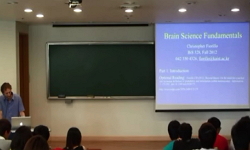Recent developments in brain research and improvements in imaging technology have increased our understanding of the nature of the human brain. The brain research challenges the belief that teaching and learning process can be separated into the cogni...
http://chineseinput.net/에서 pinyin(병음)방식으로 중국어를 변환할 수 있습니다.
변환된 중국어를 복사하여 사용하시면 됩니다.
- 中文 을 입력하시려면 zhongwen을 입력하시고 space를누르시면됩니다.
- 北京 을 입력하시려면 beijing을 입력하시고 space를 누르시면 됩니다.
부가정보
다국어 초록 (Multilingual Abstract)
Recent developments in brain research and improvements in imaging technology have increased our understanding of the nature of the human brain. The brain research challenges the belief that teaching and learning process can be separated into the cognitive, affective, and psychomotor domains. Neuroscientific insights assert that each and every learner in the classroom has a unique brain and a great capacity to learn when exposed to relevant learning strategies. On the basis of brain theories, this article provides a brief overview of current brain research and reviews several central notions regarding the functions of the brain, and discusses the implications of the brain research in meeting the needs of learners and teachers in the church classroom.
참고문헌 (Reference)
1 Eliot,L, "What’s going on in there?: How the brain and mind develop in the first five years of life" Bantam Books 1999
2 Luria,A.R, "The working brain: An introduction to neuropsychology" Penguin 1973
3 MacLean,Paul D, "The triune brain in revolution: Role in paleocerebral functions" Plenum Press 1990
4 Hebb,D.O, "The organization of behavior" Wiley 1949
5 LeDoux,J, "The emotional brain" Simon & Schuster 1996
6 Parnavelas,John, "The Human Brain: 100 Billion Connected Cells. In From brains to consciousness?" Princeton University 1998
7 Wittrock,M.C, "The Cognitive Movement in Instruction" 13 : 15-29, 1978
8 Dunn,R, "Strategies for educating diverse learners" Phi Delta Kappa Educational Foundation 1995
9 Cardillichio, T, "Seven Strategies That Encourage Neural Branching" 54 (54): 33-36, 1997
10 Larsen,J, "Religious education and the brain" 2000
1 Eliot,L, "What’s going on in there?: How the brain and mind develop in the first five years of life" Bantam Books 1999
2 Luria,A.R, "The working brain: An introduction to neuropsychology" Penguin 1973
3 MacLean,Paul D, "The triune brain in revolution: Role in paleocerebral functions" Plenum Press 1990
4 Hebb,D.O, "The organization of behavior" Wiley 1949
5 LeDoux,J, "The emotional brain" Simon & Schuster 1996
6 Parnavelas,John, "The Human Brain: 100 Billion Connected Cells. In From brains to consciousness?" Princeton University 1998
7 Wittrock,M.C, "The Cognitive Movement in Instruction" 13 : 15-29, 1978
8 Dunn,R, "Strategies for educating diverse learners" Phi Delta Kappa Educational Foundation 1995
9 Cardillichio, T, "Seven Strategies That Encourage Neural Branching" 54 (54): 33-36, 1997
10 Larsen,J, "Religious education and the brain" 2000
11 Young,J.Z, "Programs of the brain" Oxford University Press 1978
12 Levy, J., "Perception of Bilateral Chimeric Figures Following Hemispheric Deconnection" 95 : 61-68, 1972
13 Bruce,B, "Our spiritual brain: Integrating brain research and faith development" Abingdon Press 2002
14 Farmer,R, "Neuroscience and social work practice: The missing link" Sage Publications 2009
15 Caine, R, "Making connections: Teaching and the human brain" Addison-Wesley Publishing Co 1994
16 Damasio,A, "Looking for Spinoza: Joy, sorrow, and the feeling brain" Harcourt 2003
17 Sperry, R., "Interhemisperic Relationships, the Neocortical Commissures: Syndromes of hemispheric Disconnection. In Handbook of clinical neurology, Vol. Ⅳ" Elsevier-North Holland Publishing Co 1969
18 Kotulak,R, "Inside the brain: Revolutionary discoveries of how the brain works" Andrews McMeel 1997
19 Kandel, E., "Essentials of neural science and behavior" Prentice Hall 1995
20 Chall, J. S, "Education and the brain: The 77th yearbook of the national society for the study of education" University of Chicago Press 1978
21 Damasio,A, "Descartes’ error" Bard/Avon Books 1994
22 Stellar, E., "Control of Posture by Reticular Formation and Cerebellum in Intact Anesthetized and in Anesthetized De-Cerebrated Cats" 176 : 52-64, 1954
23 Jensen,E, "Brain-based learning" Turning Point 1996
24 MacLean,Paul D, "A Mind of Three Minds: Educating the Triune Brain. In Education and the brain: The 77th yearbook of the national society for the study of education" University of Chicago Press 308-342, 1978
동일학술지(권/호) 다른 논문
-
The Image of God in Human Being and the Tasks of Christian Education
- 한국기독교교육학회
- 박은혜
- 2011
- KCI등재
-
The Tasks of Korean Christian Education in the Global Period
- 한국기독교교육학회
- 김국환
- 2011
- KCI등재
-
- 한국기독교교육학회
- 이규민
- 2011
- KCI등재
-
Understanding and Application of Transformative Learning for Adult Education in the Church
- 한국기독교교육학회
- 이은성
- 2011
- KCI등재
분석정보
인용정보 인용지수 설명보기
학술지 이력
| 연월일 | 이력구분 | 이력상세 | 등재구분 |
|---|---|---|---|
| 2022 | 평가예정 | 재인증평가 신청대상 (재인증) | |
| 2019-01-01 | 평가 | 등재학술지 유지 (계속평가) |  |
| 2016-01-01 | 평가 | 등재학술지 유지 (계속평가) |  |
| 2015-03-31 | 학회명변경 | 영문명 : The Korean Society Of Christian Education -> The Korean Society of Christian Religious Education |  |
| 2014-12-31 | 학술지명변경 | 외국어명 : A Journal of Christian Education in Korea -> Journal of Christian Education in Korea |  |
| 2012-01-01 | 평가 | 등재 1차 FAIL (등재유지) |  |
| 2009-01-01 | 평가 | 등재학술지 선정 (등재후보2차) |  |
| 2008-01-01 | 평가 | 등재후보 1차 PASS (등재후보1차) |  |
| 2006-06-30 | 학회명변경 | 영문명 : The Korean Society Of Christian Education -> The Korea Society for the Study of Christian Religious Education |  |
| 2006-06-21 | 학회명변경 | 영문명 : The Korean Society Of Christian Education -> The Korean Society for the Study of Christian Religious Education |  |
| 2006-01-01 | 평가 | 등재후보학술지 선정 (신규평가) |  |
학술지 인용정보
| 기준연도 | WOS-KCI 통합IF(2년) | KCIF(2년) | KCIF(3년) |
|---|---|---|---|
| 2016 | 1.22 | 1.22 | 1.12 |
| KCIF(4년) | KCIF(5년) | 중심성지수(3년) | 즉시성지수 |
| 0.96 | 0.87 | 1.101 | 0.15 |




 스콜라
스콜라




